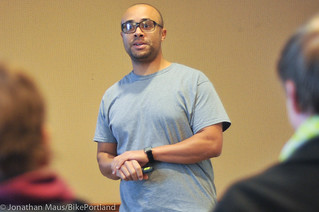After his first 50 days as the CEO of the Community Cycling Center, Mychal Tetteh sees a big problem in the local advocacy ecosystem: Too many people aren’t sure how, where and when to get engaged. And as a result, their voices aren’t being heard.
His solution? A crowd-sourced and curated compendium of all the region’s active transportation events, meetings, comment periods, open houses, and so on. All these things are “avenues to advocacy” that Tetteh would like to make accessible to Portlanders — especially those in underserved communities where many people have trouble meeting their basic needs.
Tetteh outlined his idea for the first time last Thursday at the monthly Bicycle Brown Bag discussion series hosted by the Portland Bureau of Transportation’s Active Transportation Division. The CCC also published more about it on their website this morning.
The CCC has always worked to bring the benefits of bicycling to underserved communities, and Tetteh’s new effort aims to do the same with advocacy. If lower-income and communities of color become involved with advocacy issues the thinking goes, the end result will better reflect community needs and bicycling (and walking) will become a more viable transportation option.
“Ultimately, we’re trying to create additional access opportunities for advocacy… We’re advocating for more advocacy.” he shared at City Hall last week. “I want to have everything that’s happening week-to-week curated; whether it’s walking, biking, and so on. And I want everyone to have access to that information.”
Tetteh shared a variety of inspirations for his idea. In his presentation at the Brown Bag, he took the audience through Maslow’s hierarchy of needs to make the point that, — unlike the housing communities where the CCC works like New Columbia and Hacienda CDC — most people currently involved in active transportation advocacy in Portland, “come from a community of privilege and don’t have to worry about the bottom of the pyramid [food, shelter, resources], so they can focus on the upper ones [creativity, achievement, and so on].”
“The main priority is to make sure we’re going to be able to get people from all walks of life access to information, as opposed to digging through a bunch of websites to find what they need.”
— Mychal Tetteh, CCC
Tetteh also said he’s “all out of patience” when it comes to moving the needle on progress for biking and walking in Portland. He pointed to our stagnant bicycle ridership numbers as a result of complacency. We’re complacent, he said, precisely because life is good in Portland. “Because it’s so much better here is why we can become complacent more than any other place in America.”
“Portland has taken this lead in active transportation; but we’re seeing our mode-share flatline. How are we going to push past that?” he asked.
Personal experiences have also shaped Tetteh’s view on this subject. He recounted a meeting he attended of the PBOT Bicycle Advisory Committee where he claims there was a discussion about what song rumble strips should play on TriMet’s new Portland Milwaukie Light Rail Bridge. “I thought, wow, what a luxury we have [to be having that discussion].” He also expressed disappointment at a transportation-related meeting he attended at Metro. “With about 13 people, we spent 30 minutes doing acronym acrobatics… It was not an effective use of my time or of those assembled,” he lamented. Turning his focus to BikePortland, Tetteh said a recent story we published about a flurry of important advocacy meetings required him to read the comments to find out specifics on where some meetings where being held. “I don’t want to have to dig into BikePortland comments — which can get kind of scary sometimes — to find out that information,” he said.
Tetteh’s ideal solution would be some sort of digital resource that would be crowd-sourced and easily used via mobile device and/or SMS.
“The main priority,” he said, “is to make sure we’re going to be able to get people from all walks of life access to information, as opposed to digging through a bunch of websites to find what they need. In the end it’s about getting our voices heard.”
Tetteh followed up his Brown Bag presentation with an email newsletter today where he fleshed out his idea further. “The infrastructure that we have in place to support active transportation advocates isn’t working as well as it should,” he wrote in the email. “I want to make sure that we are hearing the needs of advocates and can begin an engagement of stakeholders that will co-create the next generation advocacy network infrastructure… We believe that greater connectivity, capacity and accessibility in our advocacy network will help ensure success in campaigns that aim to improve the built environment through transportation projects.
Tetteh encourages anyone interesting in helping the CCC develop this new advocacy tool to email avenues@CommunityCyclingCenter.org. The next step will be to pull a meeting of interested parties together. Stay tuned.


